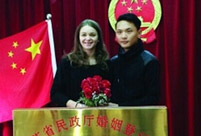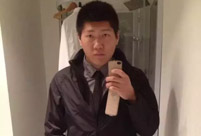

Today is the day Taiwan's new "president" Tsai Ing-wen and "vice president" Chen Chien-jen are to deliver their inauguration speeches and assume office. A new era for a cross-Straits region that is characterized by uncertainty officially kicks off.
The content of Tsai's speech was a constant source of media speculation right up until the last minute. The truth is that through a series of signals over the last two months, Tsai and her Democratic Progressive Party (DPP) have already made known what they believe. All she needs to do is play a few word games.
It is widely believed that Tsai will not publicly recognize the 1992 Consensus and the one-China principle. But she might use some ambiguity to soften the stance, in order to make her concept of "maintaining the status quo" persuasive.
Compared with Taiwan's former leader Chen Shui-bian, who attempted to promote "jurisprudential independence" against the one-China principle, the DPP is expected to take a softer approach toward independence. It is a flanking tactic to avoid direct confrontation with the Chinese mainland. What can be assured is that DPP's rule will make the suggestion of Taiwan independence further expand in Taiwan society, and take a larger step away from the mainland politically.
According to analysts, all the DPP wants is to establish a mode which Taiwan people acknowledge, the US accepts, and the mainland will have to tolerate. If we accept it, then peace will come more easily. But it means that from then on, the mainland admits that refusing to accept the one-China policy is not only the attitude of the DPP itself, but has become the formal stance of the entire island. Meanwhile, there is another option for the mainland - shifting the focus of cross-Straits ties to piling pressure on Tsai's administration from every single aspect, including politics, economy and military.
However for the mainland, is it a worthy fight with the Tsai administration, which is more moderate than Chen Shui-bian's, but marks a significant regression in the one-China principle.
The mainland's endeavors during Chen's "presidency" showed that "jurisprudential independence" will never work out on the island. However, certain people are still holding on to the fantasy that "soft independence" might be workable. Perhaps a new round of contention is inevitable to completely drive the topic of Taiwan independence away while making the one-China principle the one and only starting point to maintain the status quo.
The DPP resuming office and refusing to acknowledge the 1992 Consensus are becoming key factors that may reverse cross-Strait ties. If the mainland indulges it, the result could be that all our previous efforts will be lost.
 French girl ties the knot with Chinese boy
French girl ties the knot with Chinese boy Beijing Style: ready for bare legs
Beijing Style: ready for bare legs Century-old station sees railyway evolution
Century-old station sees railyway evolution Enthusiasts perform Kung Fu at Wudang Mountain
Enthusiasts perform Kung Fu at Wudang Mountain Stunning photos of China's fighter jets in drill
Stunning photos of China's fighter jets in drill Monk's mummified body to be made into a gold Buddha statue
Monk's mummified body to be made into a gold Buddha statue Former Chinese solider of the French Foreign Legion seeks wife online
Former Chinese solider of the French Foreign Legion seeks wife online Asia's longest and highest suspension bridge to open to traffic
Asia's longest and highest suspension bridge to open to traffic China's first interactive robot looks like a beauty
China's first interactive robot looks like a beauty Top 20 hottest women in the world in 2014
Top 20 hottest women in the world in 2014 Top 10 hardest languages to learn
Top 10 hardest languages to learn 10 Chinese female stars with most beautiful faces
10 Chinese female stars with most beautiful faces China’s Top 10 Unique Bridges, Highways and Roads
China’s Top 10 Unique Bridges, Highways and Roads Hong Kong opposition should seize the moment
Hong Kong opposition should seize the moment Trump’s anti-immigrant rhetoric strikes a chord with Chinese Americans
Trump’s anti-immigrant rhetoric strikes a chord with Chinese Americans China rejects latest US steel measures
China rejects latest US steel measures Is the wage gap between expats and locals a function of the market – or plain old discrimination?
Is the wage gap between expats and locals a function of the market – or plain old discrimination?Day|Week